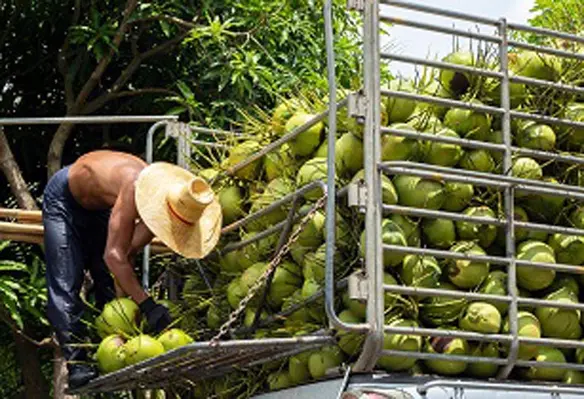The Mekong Delta province of Bến Tre is expanding the development of value chains for key agricultural products
The key agricultural products include coconut, rambutan, green-skin and pink-flesh grapefruit, longan, flowers and ornamental plants, pigs and cattle.
Bến Tre, which is Vietnam’s largest coconut producing province, has more than 78,000 ha of coconut with an annual output of 688 million nuts. More than 70% of the province’s population earns their income related to coconut growing and production.
A network of 32 co-operative groups and 28 co-operatives, with a total of more than 6,200 members, have developed value chains for a total of more than 5,648 ha of coconut.
More than 348 ha of rambutan, 98.5 ha of longan and 374 ha of green skin and pink flesh grapefruit in the province have value chains to secure the quality of the fruits, buyers and stable prices for farmers.
Nguyễn Văn Nhịp in Giồng Trôm District’s Phước Long Commune has linked with a processing company to grow coconut under organic methods for two years. After linking with the company, he has secured buyers and gets a selling price of VNĐ5,000 - 8,000 (approx. US$0.21-0.34) per dozen of coconut higher than the market price.
The company teaches him organic growing techniques, and this helps reduce the cost of chemical fertilisers and pesticides.
The province has 67 co-operative groups and 67 co-operatives which link with companies to develop value chains for their agricultural production, according to its Department of Agriculture and Rural Development.
Ngô Tường Vy, general director of the Chánh Thu Export and Import Fruit Company Limited in Chợ Lách District, said her company supported the linkage between farmers, co-operatives and companies, and this linkage needed to focus on the long term and sustainability.
The company hopes the department will assist it to develop a value chain for 100-200 ha of durian. It is willing to invest in co-operatives and assist in managing and operating them properly, according to Vy.
Huỳnh Quang Đức, deputy director of the department, said co-operative groups and co-operatives were weak in linkages with other related stakeholders in their production. The linkage between farmers and companies in some localities was not sustainable and effective, he said.
Most companies participating in value chains which buy agricultural produce, except coconut, were small or medium sized, did not have stable buyers and were easily affected by many reasons.
“The province will strengthen implementing advocacy activities, transfer farming techniques and provide consultancy for developing value chains,” Đức said.
The measures would include developing linkages among farmers through co-operative groups and co-operatives, between co-operative groups and co-operatives and companies, and developing companies which lead related stakeholders to develop strong value chains, he said.
The province aims to get production value of US$1bn for coconut and shrimp each in 2025, and US$500mn for cattle, and flowers and ornamental plants each.
It will develop six concentrated coconut growing areas, including five organic coconut growing areas for a total of 1,826 ha and a 20 ha coconut growing area for harvesting young nuts for drinking juice.
More farmers in the province have switched to growing their agricultural produce with good agricultural practices (GAP) standards, along with origin traceability and brand names, to improve value.
The province has more than 24,240 ha of coconut, fruits and aquaculture which are cultivated under GAP or organic standards




